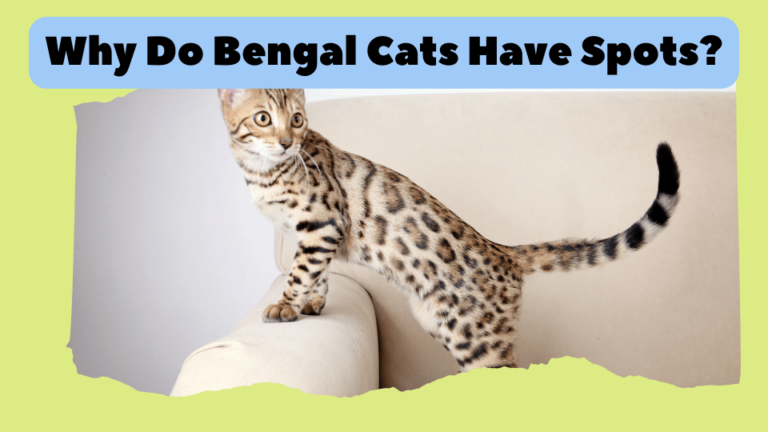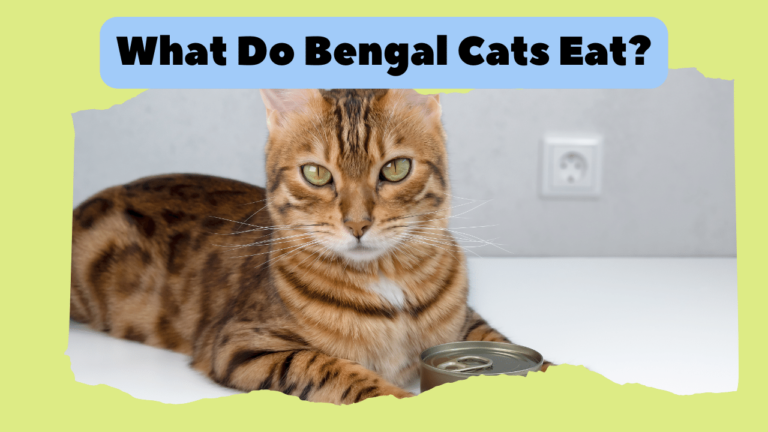
Bengal Cats for Sale |Bengal Kittens for Sale

Why Do Bengal Cats Have Spots?
Bengal cats are one of the most striking and exotic-looking domestic cat breeds, known for their wild appearance and distinctive spotted coat. If you’ve ever seen a Bengal cat, you’ve probably marveled at its unique spots and wondered, “Why do Bengal cats have spots?” The answer lies in a fascinating blend of genetics, evolution, and…

What Do Bengal Cats Eat: A Comprehensive Guide
Get this comprehensive guide on the best nutrition for your Bengal cat.
Each of the Bengal kittens for sale that are listed below are offered by our Verified Bengal Breeders through a strict vetting process. You can be assured that these are legitimate listings, and actual breeders. We don’t guarantee the satisfaction of service or quality of kitten coming from these breeders, only that they are registered and verified through our process.
No Listings were found matching your selection.
Introduction
Bengal cats are a domestic cat breed created by breeding domestic cats with Asian Leopard Cats (ALCs). The resulting cats have a wild, exotic appearance, with spots and rosettes on their coats and distinctive facial features. They are known for their intelligence, athleticism, and playful personalities.
Bengal cats have captured the hearts of cat enthusiasts worldwide, with their striking appearance and fascinating history. Originating from the wild and exotic Asian leopard cat, these domesticated felines boast a perfect blend of captivating looks, playful antics, and a truly one-of-a-kind personality. In this article, we’ll dive into the mesmerizing world of the Bengal cat, exploring their origins, characteristics, and care needs. So, buckle up, and get ready to embark on a feline adventure that’s nothing short of purr-fect!
The Bengal Cat: A Glimpse at Their Wild Roots
From Jungle to Home Sweet Home
The Bengal cat’s journey from the untamed wilderness to our cozy living rooms is a tale worth telling. In the 1960s, a geneticist named Dr. Willard Centerwall began crossbreeding Asian leopard cats with domestic breeds, aiming to develop a feline with a wild appearance but a gentle, friendly demeanor. The successful breeding program led to the emergence of the Bengal cat we know and love today.
Wild at Heart: The Asian Leopard Cat Connection
The Bengal cat’s wild ancestry can be traced back to the Asian leopard cat, a small wild feline found throughout South and Southeast Asia. Boasting a strikingly similar appearance to a leopard or jaguar, these cats are known for their incredible agility and stealth. Their influence on the Bengal cat’s gene pool has resulted in a breed with an enchanting, untamed allure.
The Bengal Cat: Unraveling Their Enchanting Characteristics
Appearance: A Feast for the Eyes
The Bengal cat is a sight to behold, with its stunning coat, vivid markings, and athletic build. Key features of this breed include:
- Large, almond-shaped eyes that range from green to gold
- Muscular, lean body with a robust bone structure
- Distinctive coat patterns, including marbled and spotted
- Soft, luxurious fur that often has a glitter-like sheen
Personality: A Wild Streak Meets Domestic Charm
Bengal cats are known for their dynamic personalities, which are equal parts endearing and entertaining. Here’s a glimpse at what you can expect from your Bengal companion:
- Playful and energetic, with a love for interactive games
- Intelligent and curious, always eager to explore and learn
- Affectionate and loyal, forming strong bonds with their humans
- Sometimes vocal, expressing themselves through a range of sounds
Caring for Your Bengal Cat: Tips for a Healthy, Happy Life
Diet and Nutrition: Fueling Their Feline Engines
To ensure your Bengal cat thrives, it’s essential to provide a balanced and nutritious diet. High-quality, protein-rich foods are ideal for these energetic felines. Opt for premium cat food brands and consider including wet food in their meals for added hydration.
Exercise and Enrichment: Keeping Their Wild Instincts Sharp
Bengal cats are athletic and energetic creatures that need ample opportunities for exercise and mental stimulation. Engage their wild instincts by providing:
- Interactive toys that mimic prey, such as wand toys and feather teasers
- Puzzle feeders and food-dispensing toys to challenge their intellect
- Cat trees and scratching posts to encourage climbing and scratching
Grooming and Health: Maintaining Their Striking Good Looks
Bengal cats have relatively low grooming requirements, thanks to their short, sleek coats. However, it’s essential to keep an eye on their overall health and well-being. Follow these tips for a well-groomed and healthy Bengal cat:
- Brush their coat once a week to remove loose hair and maintain its lustrous sheen
- Regularly check their ears for dirt and debris, and clean as needed with a gentle, feline-friendly solution
- Schedule annual vet check-ups to stay on top of vaccinations, dental care, and any potential health concerns
The Bengal Cat: FAQs
Are Bengal Cats Wild Animals?
Bengal cats are a domestic cat breed with a distinctive wild appearance, but they are not wild animals. They are a hybrid breed created by crossing an Asian leopard cat (a small wild cat species) with a domestic cat, typically an Egyptian Mau, Abyssinian, or other shorthaired breeds. The purpose of this crossbreeding was to create a cat with the beautiful, wild look of a leopard cat but the friendly and social temperament of a domestic cat.
Though Bengal cats have wild ancestry, they are considered domesticated animals. Early generations of Bengal cats (F1 and F2) may exhibit more wild behaviors due to their closer relationship with their wild ancestors, but later generations (F3 and beyond) are typically well-suited for life as household pets. These later-generation Bengal cats are more social, adaptable, and suitable for living with humans, much like other domestic cat breeds.
Do Bengal cats make good pets?
Bengal cats can make excellent pets for the right person. They are intelligent, active, and playful, and they can be very affectionate with their owners. However, they do require a lot of attention and stimulation, and they may not be the best choice for someone who is away from home for long periods. They may also be more demanding than other cat breeds and may not be suitable for first-time cat owners.
Are Bengal cats good with children and other pets?
Absolutely! Bengal cats are generally sociable and adapt well to living with children and other pets. However, early socialization is key to ensure a harmonious household. Just remember that every cat is an individual, so always supervise interactions and respect each pet’s boundaries.
While no cat breed is completely hypoallergenic, some people with allergies find they have a milder reaction to Bengal cats. This is likely due to their short, dense coat, which produces less dander and loose hair than other breeds. However, it’s essential to spend time around a Bengal cat before committing to adoption if you have allergies, as individual reactions can vary.
How big do Bengal cats get?
Bengal cats are a medium to large breed, with males typically weighing between 10-15 pounds and females weighing between 8-12 pounds. They are known for their muscular, athletic build, and they tend to be longer and more slender than other domestic cat breeds.
How much do Bengal cats cost? | How Much Are Bengal Cats?
Bengal cats can be expensive, with prices ranging from a few hundred to several thousand dollars depending on the quality of the cat and the breeder. Bengals from reputable breeders are generally more expensive than those from less reputable sources, but they also come with the added benefit of being healthier and having a known pedigree.
The cost of a Bengal cat varies depending on factors such as pedigree, coat pattern, and breeder reputation. Expect to pay anywhere from $1,000 to $5,000 for a purebred Bengal kitten.
Do Bengal cats shed a lot?
Bengal cats do shed, but they tend to shed less than other cat breeds. Their short, dense coats are prone to matting, so they require regular grooming to keep their coats healthy and looking their best.
Are Bengal cats prone to any health problems?
Bengal cats are generally healthy, but like all breeds, they can be prone to certain health issues. These can include respiratory problems, dental issues, and skin allergies. It is important to work with a reputable breeder who can provide information on the health of the cat’s parents and grandparents, as this can help to reduce the risk of inherited health problems.
Can Bengal cats be litter trained?
Bengal cats can be litter trained just like any other domestic cat. It is important to start training them at a young age and to be consistent in your training methods. It may also be helpful to provide plenty of positive reinforcement, such as treats and praise, when your cat uses the litter box successfully.
Overall, Bengal cats are a beautiful and intelligent breed that can make excellent pets for the right person. They require a lot of attention and stimulation, and they may not be the best choice for everyone. However, with the proper care and training, they can be a loving and rewarding addition to the family.
Conclusion
The Bengal cat is a truly extraordinary breed that combines the allure of the wild with the charm of a domestic feline. Their striking appearance, engaging personality, and fascinating history make them a captivating choice for cat lovers seeking a unique companion. By understanding their wild roots, characteristics, and care needs, you can provide a nurturing home for your Bengal cat and forge a bond that’s nothing short of magical. So, are you ready to welcome a Bengal cat into your life? These enchanting felines are sure to leave a paw print on your heart that lasts a lifetime.
